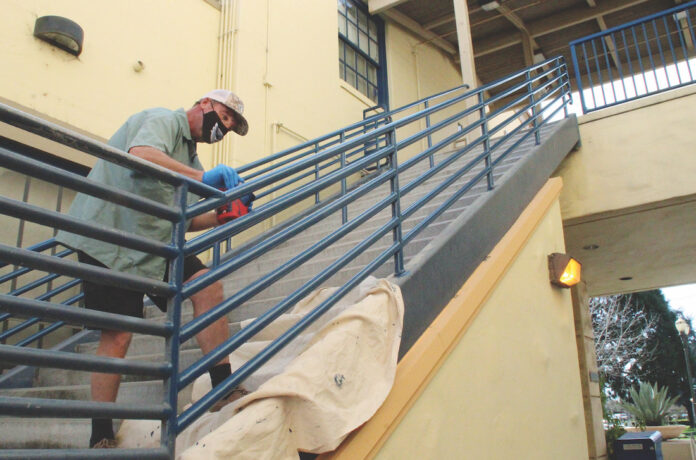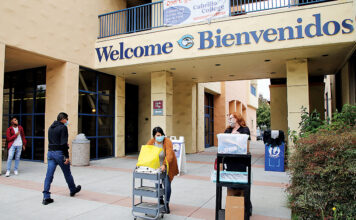APTOS—When Covid-19 began to sweep the U.S.—and brought with it an economic recession—Cabrillo College officials expected a jump in enrollment that typically comes with a battered economy.
But the college is now seeing a significant drop in those numbers, which it pins on the double calamity of the pandemic and the CZU August Lightning Complex fires, along with a lower birth rate that affected the current generation of incoming college students.
The enrollment numbers are expected to improve somewhat after the winter semester begins on Jan. 25, Cabrillo spokeswoman Kristin Fabos said.
Still, according to Cabrillo President Matt Wetstein, enrollment in the current semester is down 18% from last year, which he said is similar to what happened during the fall 2020 semester. That’s when the CZU Complex in September displaced hundreds of residents from their homes in the Santa Cruz Mountains, affecting an estimated 30% of Cabrillo’s students.
“We went from about 10% down to 18% down in the course of a week,” he said.
Wetstein worries that some of those numbers might not rebound. Sonoma County lost about 2,000 residents after the 2017 Tubbs Fire.
“I would anticipate that we’re going to lose 100 to 200 students permanently, based on the patterns I’ve seen,” he said.
The downward trend is the same for both two- and four-year colleges across the U.S. According to the National Student Clearinghouse Research Center, community colleges showed a nearly 19% drop in enrollment in the fall, while public four-year colleges saw a 10.5% drop.
Hartnell College in Salinas is also experiencing a drop in enrollment, although the college is also seeing an increase in the number of credit hours among students that are enrolled.
Hartnell Director of Communication, Marketing and Public Relations Scott Faust attributes that in part to the college’s Salinas Valley Promise Program, which offers free tuition to new students, along with academic help.
Hartnell also offers hotspots and laptops to students having difficulty with distance learning, and financial assistance.
“We’re doing everything we can to reach those students,” Faust said.
A recent survey of Cabrillo students who dropped classes showed that 27% said it was because they don’t like online classes, while 19% said it was concerns over Covid-19. Meanwhile, 14% listed the fire as a reason.
The decline is affecting nearly every discipline, particularly in the college’s Visual and Performing Arts department. Adult education and ESL classes have also taken a hit, as residents affected by the Covid-19 crisis struggle to make ends meet, Wetstein said.
“If you’re choosing between going to school or putting food on the table or buying medicine or whatever it is, I think understandably people are making economic choices for their economic survival and their household survival,” he said.
At the same time, the college’s science classes are showing higher-than-average enrollment, particularly in biology and chemistry. Wetstein attributes this in part to increased interest in health careers.
He also said the subjects gained more popularity after Dr. Anthony Fauci—the nation’s top infectious disease expert who served on President Donald Trump’s Coronavirus taskforce—famously sparred with the president over the importance of Covid-19 safety measures such as mask-wearing. Wetstein called this “the Fauci effect.”
Compounding all of this, Wetstein said, is that the college was already looking at declining enrollment before the fires and the pandemic hit. Numbers of students have steadily dropped, from 17,252 in the 2016-17 school year, to 16,173 in 2019-20.
“We’re entering a period in Santa Cruz County, and pretty much nationally, where there is a slight downward trend in high school graduations that are expected anyway,” he said.
That means that Local Control Funding Formula based partially on enrollment could take a commensurate hit, which could lead to “catastrophic” cuts within 2-3 years,Wetstein said.
“We’re not alone,” he said. “We’re in a statewide and a national downward slope in community college enrollment across the board. Ours is just a little more significant.”
However, there was some good news announced Jan. 14, as Cabrillo said it would receive $8.8 million in federal funding thanks to the Coronavirus Response and Relief Supplemental Appropriations Act.
A minimum of $2 million must be used to provide direct emergency grants to help students defray the costs of attending college. Cabrillo said it will work to disburse individual grants of roughly $500 to students as soon as possible, and that students could receive the money as early as February.
Sign up to read the full article for free
Create a free account to unlock the full story.
Don’t have an account? Create one here











